The Showcase took place at specially designed and relocated Pachamama Stage overlooking the Danube River, dedicated to the World and Conscious Music. This was a unique opportunity to encounter the Balkans World Music scene, a hidden gem that emerged from the complex historical clashes of civilisations which made this sound profoundly unique, authentic, and exotic.
Read MoreShowcase
Pachamama / WOMBA Stage

Mose ft. Sam Garrett
Guatemala

Sevdah, this heartbreakingly beautiful and complex Balkan genre is reborn in jazz, pop, and contemporary classical in Divanhana’s tasteful performances.
Divanhana is a Bosnian sevdah band that performs traditional music in new arrangements, influenced by jazz, pop, and 20th century classical music. Divanhana’s mission is to cherish and represent urban traditional music not only from Bosnia and Herzegovina, but from the whole Balkan region with a particular attention to the Sevdalinka genre.
The band was founded in early 2009 by young students from the Sarajevo Music Academy. So far they recorded four studio and one live album published by local and international record labels, threw over 300 concerts all over the world and held countless workshops for young musicians.
Divanhana collaborated with lots of great artists from all around the globe such as Suzan Kardeş (Turkey), Svetlana Spajić (Serbia), Džambo Agušev (Macedonia), Livio Minafra (Italy), Sanel Redžić (Germany), Bradley Dean (US), and others.
Divanhana also presented a documentary of their 2018 “Zukva” tour produced and broadcasted by Al Jazeera Balkans.
At the moment Divanhana is in the process of recording and producing their 5th studio album in Ljubljana, Slovenia.
Divanhana
Bosnia and Herzegovina
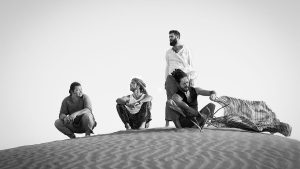
Built from the complicated history of ex-Yugoslavia, Naked plays happy music about sorrow – music with unwavering honesty, with a nakedness of both heart and soul.
The name Naked stands for open heart and uncovered soul. Ideas of freedom, hope and love have always inspired Serbian band Naked to create music, firmly rooted in a unique mix of traditional Balkan, global urban, swing, funk, odd
rhythms, and free-jazz. Naked was founded in 2007. Collaborating for over a decade, they have released four albums, performed around the world from Chile to Korea and at festivals like Colours of Ostrava, EXIT, Read See Jazz Festival, and ACC festival to name a few.
A gypsy violin, saxophone and clarinet converse with the melody accompanied by a tight, upbeat bass and drum section. Together they generate a sense of an updated global-urbanism, synergies powered by diversity, a natural crossover of swing, funk, trippy psychedelic dub, classical music with specks of the Mediterranean and Africa, Eastern European traditions as well as bebop, odd-rhythm and free-jazz.
The All About Jazz website calls their music a labour of love, describing the band as a mesmerising unit and a collective whose musical syntax continues to suggest that there are not several musicians here, but one.
Naked
Serbia

Praful
The Netherlands

Maya Kamaty
Réunion Island
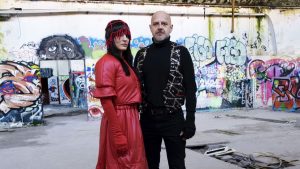
The music of the Albanian duo is an electronic reinterpretation of the traditional music of their hometown – Shkoder. Shkodra Elektronike is based in Italy.
Shkodra Elektronike are Kole Laca and Beatriçe Gjergji. Kole Laca (keyboard player and musical producer) is member of several Italian bands, among others Il Teatro Degli Orrori and 2Pigeons. Kole produced songs and albums for Italian and French artists, and as a piano/keyboard player, he has collaborated with many, among them Roy Paci, Jino Touche, Afterhours, Pierpaolo Capovilla.
In 2019 they founded the band Shkodra Elektronike together with singer Beatriçe Gjergji. Before the pandemic, the band performed at many – both Italian and Albanian – events: opening of the Albania/Kosovo pavilion at the 2019 Venice Biennale, exhibition opening for contemporary artist Adrian Paci in Tirana, Zā Fest IV, and more. Every performance was warmly welcomed by the diverse audience.
The upcoming EP by Shkodra Elektronike features 4 traditional Albanian songs, rearranged in a contemporary key and performed live on an old soundstage in Tirana’s suburbs. The full live set was filmed and edited by Kube Studios, the leading Albanian creative agency. The location reminds of the dark times of the dictatorship, the stagnation it left behind, and the constant need by Albanian people to evolve and to get away from the anonymity and the indifference that always subsisted against our culture. Sometimes it’s hard to say what year you’re in, when you are in Albania, and so it is in these videos: old TVs, handmade visual effects, dust, desolation, flashbacks and samples of the original songs juxtaposed to our renewed synthetic sound.
Shkodra Elektronike
Albania
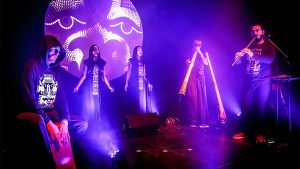
Ethnobass performed in an extraordinary manner – in front of Space Invaders, for example – is the essense of the Bulgarian Oratnitza.
Oratnitza are six young Bulgarian musicians who share a love for both folklore and contemporary bass genres. They hence call their unique sound “ETHNOBASS”. Ever since their birth Oratnitza has been driven by their curiosity to find out what lies beyond the musical status quo. This has made them take Bulgarian folklore on a wild journey. Over the years their repertoire has absorbed colors and scents from the local underground and distant continents alike. Bringing the treasures from their explorations home, they pass on the torch of tradition.
Oratniza’s music is a blend of Bulgarian folk melodies, orthodox-style chanting, world music elements, hip-hop, dubstep, trap, D’n’B, and irregular rhythms. Oratniza interprets Bulgarian traditional songs in a way our generations can truly embrace.
Oratnitza
Bulgaria

Fia
Sweden
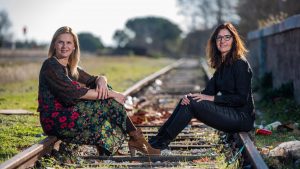
Dina e Mel is a duo who researches and performs minority music, creating new music out of the small fragments that survived long and turbulent history of the Balkans. The result is an album that erases the current borders of the Eastern Balkans and melts together elements of music in unexpected ways.
Dina Bušić and Melita Ivković, Dina e Mel, play together since 2012. Both classicaly trained musicians, Dina (musicologist and singer), Melita (guitarist) from Music Academy in Zagreb, they live in their hometown, Zadar (Croatia). They share the passion for research in music as well as the excitement for searching paths that can help them create new output of authentic, old and undiscovered music traditions.
Their project “Nightingale” builds around almost completely forgotten music of Arbresh that migrated from Skadar Lake (now microlocations in Montenegro) to the area just next to the Venetian city walls of Zadar.
Dina made an ethnological processed research and Melita created a very brave interpretation of the findings, using her wide array of music knowledge with the fragments of music that survived turbulent history full of twists through last 300 years in Zadar.
The people of Arbresh created their own language, a mix of old Albanian, Italian and Croatian (that they included when they transferred to Zadar and started forgetting parts of their native language). Some of the traditional songs that survived are authentic, some of them are shared with Bosnia and Herzegovina, Serbia, Montenegro, Bulgaria and Turkey, and some of them were original pieces composed by Arbresh musicians.
The result of Dina e Mel’s work and approach is an album that erases the current borders of the Eastern Balkans and melts together elements of music in unexpected ways. Dina e Mel share the respect of the authentic base, but also the courage to build with elements of classical music, Balkan world music, Italian tradition and even their passion and love, fado and bossa nova.
Dina e Mel
Croatia
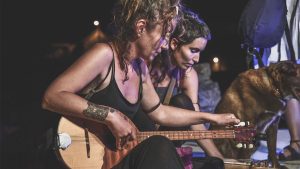
Acoustic dark folk from North Macedonia – Perija creates one big Balkan fusion of languages, dialects and music influences, with modern and historical themes.
Perije merges traditional music of the areas they live in, Middle-Eastern Maqam music and some North-African styles, blues, post-punk, atonal and jazz. Their songs are in different languages of the Balkans, as to share an idea of equality between nations and ethnicities, and the themes of their songs are ranging from important social issues of the present (poems from acknowledged authors), newspaper clippings, to old, and often morbid village songs (some of them collected by friends who travel to villages and record them, some of them found in very old recordings).
Perija is a Turkish root word for „fairy”, and it is this mythological connection with the darkness of the Balkan forests, a feeling that they try to convey in their music.
The current members are Lea Milinovikj, Dea Plevnesh, Filis Sinanoska, Katerina Dimitrovska and Ognen Zlatanov.
Perija
North Macedonia

E.U.E.R.P.I. is the guitar drone ambient project of Mirian Kolev, who lives and composes in the Balkan Mountains, in Bulgaria. His music is minimalistic, meditative and discreetly psychedelic.
The improvisation is an important and fundamental part of each of his live performances, turning it into an expressive soundtrack of space-time. He makes live performances at different kinds of spaces – from intimate performances in small art cafes, through galleries, cultural centers, music clubs, art, film and music festivals to shows in cathedrals, temples, caves, airports. Every place is unique, so every performance is unique. He often takes part in multidisciplinary projects and collaborates with different artists – musicians, visual artists, performers.
E.U.E.R.P.I.
Bulgaria

Laor
Israel
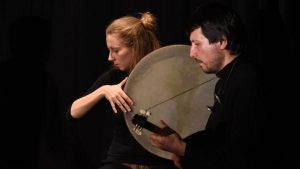
The Flying Nomads duo creates fusion music, combining traditional ethno and modern styles. Their belief is that if a song is made by the soul, it is possible to reach the soul of the listener, and this is incorporated in their work.
The musicians are Kristina Angelova and Daniel Angelov, both born in Bulgaria – the border between Europe and Asia. It is a country with ancient traditions, which in nowadays incorporates the qualities of the East and the West. This gives the opportunity and knowledge for the musicians to create a unique World Music. The main instruments that the musicians play are Bulgarian tambura and Iranian daf, but you can also hear in their songs guitar, ukulele, bendir and more. With all that sound from Eastern and Western instruments, the artists create their music entirely with acoustic sound. They believe, that if a song is made by the soul, it is possible to reach the soul of the listener. That is exactly what they incorporate in their works.
Flying Nomads
Bulgaria

Norwegian folk mixes well with Balkan klezmer, and much else – at least it does in this unique duo of violin and accordion, of Almir Meskovic and Daniel Lazar.
Almir Meskovic and Daniel Lazar both have over 20 years of experience in classical and folk music. With their roots in the Balkans and using Scandinavian elements, this duo offers something truly unique. They blend a wide range of styles and genres ranging from Balkan rhythms to Mozart, from improvisation to Gypsy music.
Almir was born in Bosnia and Daniel was born in Serbia. They grew up with folk music from the heart of the Balkans, where music and cultures from around the world meet and melt together – Gypsy music, klezmer, classical, and everything in between (Norwegian folk, among other things).
It was only in Norway that the two artists met while studying at the Norwegian Academy of Music’s master’s program. Here they developed their own expression, getting the most beautiful melodies out of the accordion and the fiddle, inspired by all epochs and styles.
Their first album “Roots” received raving reviews from critics and were beloved by audiences:
- Top 20 list of the best world music albums in 2018 by Jungetelegrafsen (NRK- national radio of Norway)
- Top 15 of the World music charts of Europe in November 2018
- best album in 2018 by radio show disco 3000 (RTB -national radio of Serbia)
- The album, as well as one of the songs on it, was chosen as the best of the month in September 2018 by Mundofonia’s radio show
- Top 15 albums of the month (November 2018) by Babel, La Música Del Mundo
They worked with various well-established artists and institutions such as KORK, National Theater, Steinar Ofsdal, Kjell Habbestad, Bozo Vreco, Silje Nergård, Jelena Tomasevic, Nanou Coul, Sidiki Camara, Bosko Jovic, Igor and Fetterne etc. In previous years, we have performed at various festivals, such as the Førdefestivalen (Norway), Mela festival (Norway), Folkelarm (Norway), Smøgafestivalen (Sweden), Kråkeslottfestivalen (Norway), Telemark festival (Norway), Osafestivalen (Norway), Krakowskifestiwal akordeonowy ( Poland), Tjedan Izraela (Zagreb) etc.
Almir Mešković & Daniel Lazar duo
Bosnia & Herzegovina, Serbia
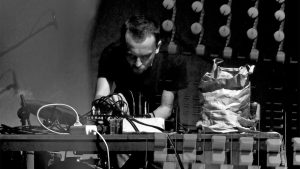
Manipulated field recordings, spoken word and sound propaganda, ethno music and other forms of cassette tape art and rhythmic loops, with performances by master folk vocalists such as Svetlana Spajić, Tijana Stanković and Mirjana Raić – this is Lenhart Tapes.
The artist writes about himself: My 2021 album “Duets” was released on September 10th, 2021. It was published on vinyl by Pop Depresija and Novo Doba. I started working on this material back in 2012 with the idea of incorporating live female folkie vocals into a bunch of cassette sampled noise I was doing back in the days. The result was a compilation of unpublished songs recorded between 2014-2018 and mixed in 2019.
Writing about music can be fun but it is always better to listen to it. I have hand-picked 8 transnational tunes, sung by two acclaimed singers, Mirjana Raić and Svetlana Spajić, plus one Lenhart Tapes Orchestra song. It was recorded in four different studios, edited and mixed by Igor Čubrilović, myself and Jovan “Shpira” Obradović. James Plotkin mastered it and Johanna Marcadé-Mot did the wonderful cover art and design.
Svetlana Spajić made a comment about working with Lenhart Tapes: “One of the secrets of Lenhart’s living and original work is that he is one of the few artists who truly knows how to make room for a singer, a song and a human voice. Lenhart cultivates deep respect, awe almost, towards the singer as the creator and the song as the bearer of the old and the traditional. The voice you hear breathing in the final recording on the record is the fruit of the artist’s humanity and respect shown in every step: from the first contact and friendship, through freedom and trust while working in the studio, to finally, the attentive and loving treatment of the voice and singer in production. With such an attitude, Lenhart brings to life also those voices that came to him from forgotten old singles and cassettes. Many could learn from Lenhart’s approach. This is perhaps the main reason why his music is irresistible and why it is a living tradition”.
Lenhart Tapes & Tijana Stanković
Serbia
Notice: WOMBA Conference Accreditation is not valid for entering the EXIT Festival venues. To purchase EXIT tickets, please visit the official webshop.